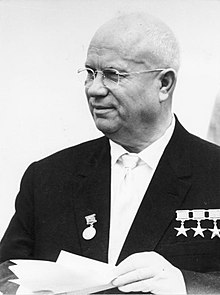

First Secretary of the Communist Party of the Soviet Union
Nikita Sergeyevich Khrushchev 15 April 1894 Kalinovka, Kursk Governorate, Russian Empire
11 September 1971(1971-09-11) (77) Moscow, Russian SFSR, Soviet Union
14 September 1953 – 14 October 1964
1953–1964 First Secretary of the Communist Party of the Soviet Union "Khrushchev" redirects here. For the surname and other people with the surname, see Khrushchev (surname). In this Eastern Slavic naming convention, the patronymic is Sergeyevich and the family name is Khrushchev. Nikita KhrushchevНикита ХрущёвNikita Khrushchev in East Berlin in June 1963 observing East German leader Walter Ulbricht's 70th birthdayFirst Secretary of the Communist Party of the Soviet UnionIn office 14 September 1953 – 14 October 1964Preceded by Georgy Malenkov (de facto)Succeeded by Leonid BrezhnevChairman of the Council of Ministers of the Soviet UnionIn office 27 March 1958 – 14 October 1964PresidentKliment Voroshilov Leonid Brezhnev Anastas MikoyanFirst Deputies See list Frol Kozlov Alexei Kosygin Dmitriy Ustinov Lazar Kaganovich Anastas Mikoyan Preceded by Nikolai BulganinSucceeded by Alexei KosyginFirst Secretary of the Communist Party of Ukraine (Bolsheviks)In office 26 December 1947 – 16 December 1949Preceded by Lazar KaganovichSucceeded by Leonid MelnikovIn office 27 January 1938 – 3 March 1947Preceded by Stanislav KosiorSucceeded by Lazar Kaganovich Personal detailsBornNikita Sergeyevich Khrushchev (1894-04-15 ) 15 April 1894 Kalinovka, Kursk Governorate, Russian EmpireDied11 September 1971(1971-09-11) (aged 77) Moscow, Russian SFSR, Soviet UnionResting placeNovodevichy Cemetery, MoscowNationalitySovietPolitical partyCommunist Party of the Soviet Union (1918–1964)Spouse(s)Yefrosinia Pisareva (m. 1914; died 1919) Nina Kukharchuk (m. 1923)ChildrenYulia Khrushcheva (1915–81) Leonid Khrushchev (1917–43) Rada Khrushcheva (1929–2016) Sergei Khrushchev (1935–2020) Elena Khrushcheva (1937–72)Alma materIndustrial AcademyAwardsHero of the Soviet Union Hero of Socialist Labor (thrice)SignatureMilitary serviceAllegianceSoviet UnionBranch/serviceRed ArmyYears of service1941–45RankLieutenant GeneralCommandsSoviet Armed ForcesBattles/warsWorld War II Central institution membership 1939–64: Full member, 18th, 19th, 20th, 22nd Presidium 1949–64: 18th, 19th, 20th, 22nd Secretariat 1949–52: 18th Orgburo 1938–39: Candidate member, 17th Politburo 1934–64: Full member, 17th, 18th, 19th, 20th, 22nd Central Committee Other offices held 1956–64: Chairman, Bureau of the Central Committee of the Russian SFSR 1949–53: First Secretary, Moscow Regional Committee 1944–47: Chairman, Ukrainian Council of Ministers 1938–47: First Secretary, Kiev Regional Committee 1938–47: First Secretary, Kiev City Committee 1935–38: First Secretary, Moscow Regional Committee 1934–50: First Secretary, Moscow City Committee Leader of the Soviet Union ← Malenkov Brezhnev → a While he was unable to consolidate control over the party apparatus, Malenkov was still recognized as "first among equals" for over a year after Stalin's death. As late as March 1954, he was listed as first in the Soviet leadership and continued to chair meetings of the Politburo. External video Part One of Booknotes interview with William Taubman on Khrushchev: The Man and His Era, 20 April 2003, C-SPAN Part Two of Booknotes interview with Taubman, 27 April 2003, C-SPAN Nikita Sergeyevich Khrushchev (15 April 1894 – 11 September 1971) was a Soviet politician who served as the First Secretary of the Communist Party of the Soviet Union from 1953 to 1964 and as chairman of the country's Council of Ministers from 1958 to 1964. During his rule, Khrushchev stunned the communist world with his denunciation of Stalin's crimes and began de-Stalinization. He sponsored the early Soviet space program, and enactment of relatively liberal reforms in domestic policy. After some false starts, and a narrowly avoided nuclear war over Cuba, he conducted successful negotiations with the United States to reduce Cold War tensions. His proclivity toward recklessness led the Kremlin leadership to strip him of power, replacing him with Leonid Brezhnev as First Secretary and Alexei Kosygin as Premier. Khrushchev was born in 1894 in a village in western Russia. He was employed as a metal worker during his youth, and he was a political commissar during the Russian Civil War. Under the sponsorship of Lazar Kaganovich, he worked his way up the Soviet hierarchy. He supported Joseph Stalin's purges and approved thousands of arrests. In 1938, Stalin sent him to govern the Ukrainian SSR, and he continued the purges there. During what was known in the Soviet Union as the Great Patriotic War (Eastern Front of World War II), Khrushchev was again a commissar, serving as an intermediary between Stalin and his generals. Khrushchev was present at the bloody defense of Stalingrad, a fact he took great pride in throughout his life. After the war, he returned to Ukraine before being recalled to Moscow as one of Stalin's close advisers. On 5 March 1953, Stalin's death triggered a power struggle in which Khrushchev emerged victorious upon consolidating his authority as First Secretary of the party's Central Committee. On 25 February 1956, at the 20th Party Congress, he delivered the "Secret Speech", which denounced Stalin's purges and ushered in a less repressive era in the Soviet Union. His domestic policies, aimed at bettering the lives of ordinary citizens, were often ineffective, especially in agriculture. Hoping eventually to rely on missiles for national defense, Khrushchev ordered major cuts in conventional forces. Despite the cuts, Khrushchev's time in office saw the tensest years of the Cold War, culminating in the Cuban Missile Crisis. Khrushchev enjoyed strong support during the 1950s thanks to major victories like the Suez Crisis, the launching of Sputnik, the Syrian Crisis of 1957, and the 1960 U-2 incident. By the early 1960s however, Khrushchev's popularity was eroded by flaws in his policies, as well as his handling of the Cuban Missile Crisis. This emboldened his potential opponents, who quietly rose in strength and deposed him in October 1964. However, he did not suffer the deadly fate of previous Soviet power struggles and was pensioned off with an apartment in Moscow and a dacha in the countryside. His lengthy memoirs were smuggled to the West and published in part in 1970. Khrushchev died in 1971 of a heart attack.

We use cookies
We use cookies and other tracking technologies to improve your browsing experience on our website, to show you personalized content and targeted ads, to analyze our website traffic, and to understand where our visitors are coming from. Privacy Policy.